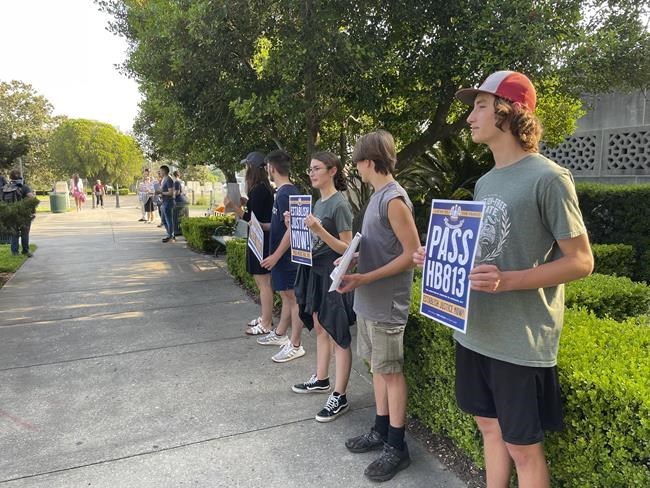NEW ORLEANS (AP) — Louisiana women who have abortions will not be subject to murder or other criminal charges after legislators revamped an abortion bill Thursday night.
The controversial bill would have ventured farther against abortion than lawmakers’ efforts in any other state. It would have made women who end their pregnancies subject to criminal homicide prosecutions.
The bill by Republican Rep. Danny McCormick unleashed increasing opposition from traditional supporters of abortion rights and longtime foes of legal abortion. McCormick abruptly ended debate on the bill and returned it to the House calendar after the amendment passed 65-26. The bill appears unlikely for passage unless McCormick decides to attempt to revive it.
THIS IS A BREAKING NEWS UPDATE. AP’s earlier story follows below.
NEW ORLEANS (AP) — Louisiana's House of Representatives, venturing farther against abortion than lawmakers in any other state, is debating a bill to make women who end their pregnancies subject to criminal homicide prosecutions.
Republican Rep. Danny McCormick pushed for a House floor debate on his bill Thursday afternoon despite a crescendo of opposition from traditional supporters of abortion rights and longtime foes of legal abortion. Louisiana’s anti-abortion governor said he'd veto it, and Louisiana Right to Life and the Louisiana Conference of Catholic Bishops are against it.
“To suggest that a woman would be jailed for an abortion is simply absurd,” Gov. John Bel Edwards, a devout Catholic and a Democrat who has long broken with his party on the abortion issue, said in a news release Wednesday.
“Our longstanding policy is that abortion-vulnerable women should not be treated as criminals,” Louisiana Right to Life said in a statement.
The Catholic bishops said they are “unequivocally" opposed to the bill. And the National Right to Life Committee on Thursday issued an “open letter to the nation's state legislators" that didn't mention the Louisiana bill specifically, but said “any measure seeking to criminalize or punish women is not pro-life and we stand firmly opposed to such efforts.”
McCormick disagrees, saying a woman who has an abortion should be in the same legal position as a woman who takes the life of a child after birth. “When I give equal protection to the unborn, that's the possibility,” he said in a Wednesday evening phone interview.
The House had not yet started debating the controversial abortion legislation when the building was temporarily evacuated Thursday after the speaker interrupted proceedings and said an unknown, unclaimed package had been found in the capitol’s Memorial Hall — the cavernous gathering area between the House and the Senate Chambers.
It came on a day when legislation was already moving slowly as lawmakers tried to find a compromise on McCormick’s bill. The House recessed for more than an hour while lawmakers broke into groups behind closed doors to discuss the legislation.
Pending at the time was a new amendment by Rep. Alan Seabaugh. The Shreveport Republican is an anti-abortion stalwart. But his amendment would completely revamp McCormick’s bill, eliminating the criminal penalties for women, allowing abortion to save the life of a pregnant woman and okaying the use of contraceptives.
McCormick's bill has drawn intense scrutiny in light of last week’s leak of a draft of a U.S. Supreme Court opinion indicating the high court is preparing to overturn decisions upholding a constitutional right to abortion.
There’s no indication yet that lawmakers in other states are taking up similar legislation. In Idaho, Republican state Rep. Heather Scott has proposed prosecuting women who get abortions, but a committee chairman said Friday he would not allow it. “There are still reasonable people in the Legislature who are going to ensure that extreme bills like that are not going to get a hearing,” Rep. Brent Crane said.
“In my committee, I’m not going to hear that bill that puts a woman on trial for murder. If you’ll take that portion of the bill out, if you’ll put the doctor on trial for murder ... then we can talk about having a hearing on your bill,” Crane said on Idaho Public Television.
McCormick introduced his bill in March in an attempt to end abortion regardless of what any court does.
In addition to rewriting homicide statutes to include abortion, it declares that any federal law, regulation or court ruling that allows abortion is void and that any judge who blocks enforcement of the bill’s provisions could be impeached.
Edwards called the bill “patently unconstitutional.”
He joined critics of the bill saying it criminalizes some types of contraception and parts of the in vitro fertilization process. McCormick on Thursday said forms of contraception that don't destroy a fertilized egg would not be affected. And he disputes that the bill would newly criminalize some aspects of in vitro fertilization, pointing to state law that already grants rights to an “in vitro fertilized human ovum.”
Anti-abortion legislation usually passes easily in Louisiana's Legislature but the emphatic opposition from some anti-abortion stalwarts could bolster attempts to derail the measure or heavily amend it.
Louisiana already has laws on the books criminalizing abortion, including a “trigger law” ensuring that it will be a crime if the Supreme Court reverses the Roe vs. Wade, the 1973 ruling establishing abortion rights. The statutes appear to exempt women from prosecution, although some abortion rights advocates have suggested they need tightening.
McCormick said the existing laws are inadequate to give fetuses equal protection under law. “This is a debate we need to have in Louisiana,” he said. “There are good people on both sides of the debate."
___
Associated Press writer Holly Ramer contributed to this report from Concord, New Hampshire.
Kevin Mcgill, The Associated Press



